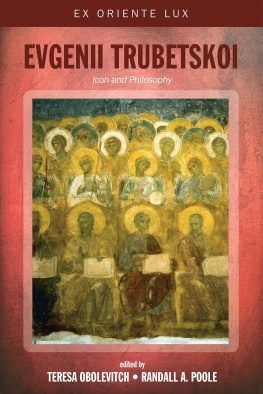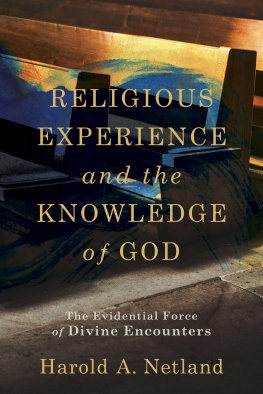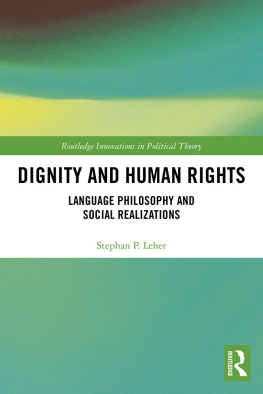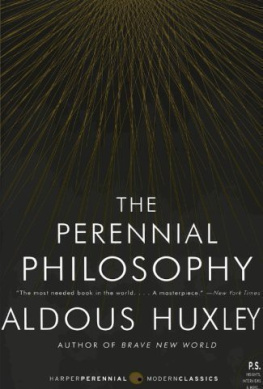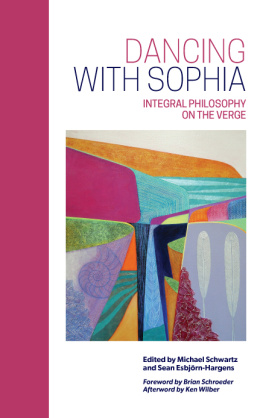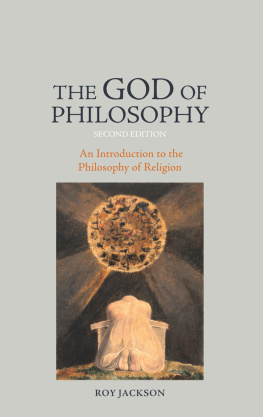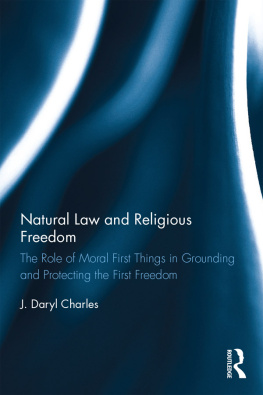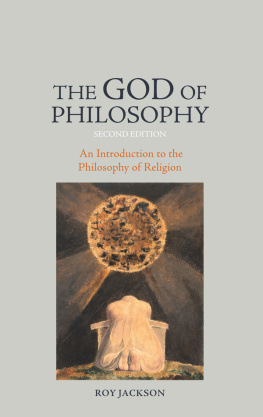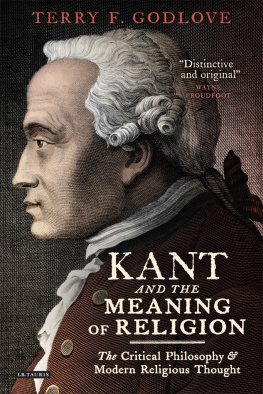Copyright 2021 Wipf and Stock Publishers. All rights reserved. Except for brief quotations in critical publications or reviews, no part of this book may be reproduced in any manner without prior written permission from the publisher. Write: Permissions, Wipf and Stock Publishers, W. th Ave., Suite , Eugene, OR 97401 .
W. th Ave., Suite
Names: Obolevitch, Teresa, 1974 ,editor. | Poole, Randall Allen, 1964 , editor.
Title: Evgenii Trubetskoi : icon and philosophy / edited by Teresa Obolevitch and Randall A. Poole.
Description: Eugene, OR : Pickwick Publications, 2021 | Ex Oriente Lux Series | Includes bibliographical references and index.
Identifiers: isbn 978-1-7252-8840-9 ( paperback ) | isbn 978-1-7252-8841-6 ( hardcover ) | isbn 978-1-7252-8842-3 ( ebook )
Subjects: LCSH: Trubetsko, E. N. (Evgeni Nikolaevich), kniaz, 1863 1920 . | Philosophy, RussianReligious aspects. | Philosophical theology.
Contributors
Anatolii Chernyaev , Leading Research Fellow and Head, Department of the History of Russian Philosophy, Institute of Philosophy, Russian Academy of Sciences, Moscow, Russia.
Ruri Hosokawa , Doctoral student, University of Tokyo, Japan.
Eric Lohr , Professor of History and Susan E. Carmel Chair of Russian History and Culture, American University, Washington, DC, USA.
Kre Johan Mjr , previously Research Scholar at the Institute for Russian and Eurasian Studies, Uppsala University, now Senior Research Librarian at Western Norway University of Applied Sciences and Associate Professor of Russian at the University of Bergen, Norway.
Teresa Obolevitch , Professor and Chair of Russian and Byzantine Philosophy, Pontifical University of John Paul II in Krakow, Poland.
Jeremy Pilch , Programme Director (Theology, Religion and Ethics), Institute of Theology, St Marys University, Twickenham, London.
Randall A. Poole , Professor and Chair, Department of History and Politics, College of St. Scholastica, Duluth, Minnesota, USA.
Walter Sisto , Associate Professor of Religious Studies, DYouville College, Buffalo, New York, USA.
Elena Tverdislova , Independent Researcher, Literature Consultant of Jerusalem Russian Library, Israel.
Natalia Vaganova , Associate Professor, St. Tikhons Orthodox University and Tchaikovsky Moscow State Conservatory, Moscow, Russia.
Tikhon Vasilyev , Tutor in Patristics and Church History, Online educational platform Philosophy. Culture. Christianity, Holy Dormition St. Basil Monastery in Nikolskoe, Donetsk Region, Ukraine.
Irina Yazykova , Deputy Rector, St. Andrews Biblical Theological Institute, Moscow, Russia.
Ex Oriente Lux
New Perspectives on Russian Religious Philosophers
series
vol.
Edited by Artur Mrwczyski-Van Allen, Teresa Obolevitch, Randall A. Poole, and Pawe Rojek
We believe that Russian religious philosophy of the nineteenth and twentieth centuries has great importance for Christian theology and philosophy. Russian thinkers, rooted in the tradition of the Church Fathers, strove for an integral knowledge of reality, based on the unity of faith and reason. Such philosophers and theologians as Peter Chaadaev, Alexei Khomiakov, Vladimir Soloviev, Evgenii Trubetskoi, Pavel Florensky, Sergei Bulgakov, Nikolai Berdyaev, Semyon Frank, Georges Florovsky, and Aleksei Losev had penetrating insight into the nature of reality and thought deeply about religion and culture, science and philosophy, and history and society. Their legacy deserves a prominent place in contemporary philosophical and theological discussions.
The series Ex Oriente Lux aims to meet this need. It serves as a way to bring Eastern Christian intuitions into the current post-secular philosophical and theological context. Each volume focuses on one Russian thinker and includes a selection of essays on the thinkers main ideas in historical and contemporary contexts. The books are prepared by Western and Russian scholars, thus creating a space for intellectual dialogue.
The series comes out of research connected with the annual conferences on Russian religious philosophy held in Krakow, Poland. The Krakow Meetings are organized jointly by the Pontifical University of John Paul II in Krakow and the Edith Stein Institute of Philosophy in Granada, Spain.
Previous Volumes
Beyond Modernity: Russian Religious Philosophy and Post-Secularism
Peter Chaadaev: Between the Love of Fatherland and the Love of Truth
Alexei Khomiakov: The Mystery of Sobornost
Future Volumes
Pawe Rojek, Theological Philosophy: Theology, Ontology, and Logic in Russian Religious Philosophy
Vladimir Soloviev: The Metaphysics of Love
Semyon Frank: The Philosophy of Absolute Realism
introduction
Evgenii Trubetskoi
Icon of Russian Philosophy
Randall A. Poole
E vgenii Trubetskoi ( 1863 1920 ) exemplified what is best in Russias religious-philosophical tradition. That tradition began with the Slavophiles Ivan Kireevskii ( 1806 1856 ) and Alexei Khomiakov ( 1804 1860 ). Trubetskoi embraced their understanding of religious experience, their holistic or integral conception of human nature, and their conviction in the necessity of both faith and reason in the pursuit of truth. His own religious experience inspired his seminal studies of the Russian iconand they, in turn, inspired the icon studies which form the second part of this book. In the s he was drawn to the Slavophile idealization of Russia, to the messianic dream of the realization of the kingdom of God on earth through Russia, but he came to reject it in favor of Christian universalism, while always maintaining his deep personal faith in Orthodoxy.
Trubetskois commitment to certain aspects of Slavophilism (its theoretical philosophy) and rejection of others (its social philosophy) helped determine his relation to the two greatest philosophers of nineteenth-century Russia: Boris Chicherin ( 1828 1904 ) and Vladimir Soloviev ( 1853 ), both metaphysical idealists and pillars of the Russian religious-philosophical tradition. Chicherin is widely regarded as the countrys preeminent liberal philosopher, and Soloviev as its most important religious philosopher. Trubetskoi combined elements of their thought in his own philosophical worldview. From Chicherin he took the paramount liberal principles of human freedom and dignity, freedom of conscience, and the rule of law. From Soloviev, to whom he was much closer personally and philosophically, he took the concept of Bogochelovechestvo (divine humanity or Godmanhood)the free human realization of the divine principle in ourselves and in the world (deification)and found in it the very meaning of life. He used each philosopher to balance the excesses of the other: He accepted Chicherins view that Solovievs social ideal of free theocracy was dangerously illiberal, while he thought Solovievs Slavophile-inspired concept of integral knowledge offered a much richer account of the full range and depth of human experience than Chicherins abstract Hegelian rationalism. Integral knowledge became Trubetskois lifelong pursuit, the unifying framework for his own powerful, multifarious experience of reality and for his philosophical workin short, for the synthesis of faith and reason to which he aspired.

